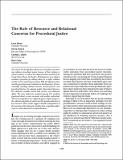|
Reseña:
|
Two studies test the hypothesis that trust, neutrality, and standing influence procedural justice because of their relation to resource motives as well as the relational motive posited by the Group Value Theory. In Study 1, El Salvadorons were asked to evaluate a procedure for seeking redress for a rights violation and the current national government. Both the rights procedure and the government were evaluated on the dimensions of trust, neutrality, standing, absolute outcome, outcome fairness, and procedural fairness. In separate models of procedural fairness, the relational variables exerted both resource and relational effects. The same model was examined among U.S. residents questioned about a recent encounter with another individual. The resource hypothesis was supported again, despite changes in the cultural and political context and the operationalization of key constructs. These studies suggest a broader interpretation of the meaning of the relational variables than is typically emphasized in current theoretical conceptualizations. |

